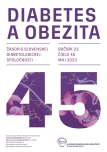Empagliflozin in patients with chronic kidney disease: results of the EMPA-KIDNEY trial and implications for clinical practice
Authors:
Peter Novodvorský 1,2,3
Authors‘ workplace:
metabolické centrum s. r. o., Trenčín
1; Centrum diabetologie IKEM, Praha
2; Department of Oncology and Metabolism, Medical School, University of Sheffield, United Kingdom
3
Published in:
Diab Obez 2023; 23(45): 49-53
Category:
Clinical studies
Overview
Chronic kidney disease (CKD) is defined by the decrease of estimated glomerular filtration rate (eGFR) or the presence of albuminuria, or both and globally affects > 850 million people. Diabetes is one of the leading causes of CKD, but, on the other hand, the majority of people with CKD do not have diabetes. Empagliflozin is a sodium - glucose co-transporter 2 inhibitor (SGLT2i) with cardiovascular benefits proven by several large clinical trials. EMPA-KIDNEY trial examined the effect of empagliflozin (10 mg/day) vs placebo on the primary composite outcome of CKD progression (defined as end-stage kidney disease, a sustained decrease in eGFR to < 10 ml/ min/1.73 m2, a sustained decrease in eGFR of ≥ 40 % from baseline or death from renal causes) or death from cardiovascular causes. In this article, I discuss the major aspects and outcomes of the EMPA-KIDNEY trial and its implications for clinical practice.
Keywords:
empagliflozin – type 2 diabetes – chronic kidney disease (CKD) – sodium-glucose co-transporter 2 inhibitors (SGLT2i)
Sources
1. Jha V, Garcia-Garcia G, Iseki K et al. Chronic kidney disease: global dimension and perspectives. Lancet 2013; 382(9888): 260–272. Dostupné z DOI: <http://dx.doi.org/10.1016/S0140–6736(13)60687-X>.
2. Jager KJ, Kovesdy C, Langham R et al. A single number for advocacy and communication-worldwide more than 850 million individuals have kidney diseases. Kidney Int 2019; 96(5): 1048–1050. Dostupné z DOI: <http://dx.doi.org/10.1016/j.kint.2019.07.012>.
3. Luyckx VA, Tonelli M, Stanifer JW. The global burden of kidney disease and the sustainable development goals. Bull World Health Organ 2018; 96(6): 414–422D. Dostupné z DOI: <http://dx.doi.org/10.2471/BLT.17.206441>.
4. Thomas MC, Cooper ME, Zimmet P. Changing epidemiology of type 2 diabetes mellitus and associated chronic kidney disease. Nat Rev Nephrol 2016; 12(2): 73–81. Dostupné z DOI: <http://dx.doi.org/10.1038/nrneph.2015.173>.
5. Luippold G, Klein T, Mark M et al. Empagliflozin, a novel potent and selective SGLT-2 inhibitor, improves glycaemic control alone and in combination with insulin in streptozotocin-induced diabetic rats, a model of type 1 diabetes mellitus. Diabetes Obes Metab 2012; 14(7): 601–607. Dostupné z DOI: <http://dx.doi.org/10.1111/j.1463–1326.2012.01569.x>.
6. Zinman B, Wanner C, Lachin JM et al. Empagliflozin, Cardiovascular Outcomes, and Mortality in Type 2 Diabetes. N Engl J Med 2015; 373(22): 2117–2128. Dostupné z DOI: <http://dx.doi.org/10.1056/NEJMoa1504720>.
7. Packer M, Anker SD, Butler J et al. Cardiovascular and Renal Outcomes with Empagliflozin in Heart Failure. N Engl J Med 2020; 383(15): 1413–1424. Dostupné z DOI: <http://dx.doi.org/10.1056/NEJMoa2022190>.
8. Anker SD, Butler J, Filippatos G et al. Empagliflozin in Heart Failure with a Preserved Ejection Fraction. N Engl J Med 2021; 385(16): 1451–1461. Dostupné z DOI: <http://dx.doi.org/10.1056/NEJMoa2107038>.
9. Novodvorský P. Skorá a efektívna intervencia pri multisystémovej dysfunkcii u pacientov s diagnózou aj bez diagnózy diabetu 2. typu. Interná Med 2022(10): 433–436.
10. Wanner C, Inzucchi SE, Lachin JM et al. Empagliflozin and Progression of Kidney Disease in Type 2 Diabetes. N Engl J Med 2016; 375(4): 323–334. Dostupné z DOI: <http://dx.doi.org/10.1056/NEJMoa1515920>.
11. Perkovic V, Jardine MJ, Neal B et al. Canagliflozin and Renal Outcomes in Type 2 Diabetes and Nephropathy. N Engl J Med 2019; 380(24): 2295–2306. Dostupné z DOI: <http://dx.doi.org/10.1056/NEJMoa1811744>.
12. Heerspink HJL, Stefansson BV, Correa-Rotter R et al. Dapagliflozin in Patients with Chronic Kidney Disease. N Engl J Med 2020; 383(15): 1436–1446. Dostupné z DOI: <http://dx.doi.org/10.1056/NEJMoa2024816>.
13. Herrington WG, Preiss D, Haynes R et al. The potential for improving cardio-renal outcomes by sodium-glucose co-transporter-2 inhibition in people with chronic kidney disease: a rationale for the EMPA-KIDNEY study. Clin Kidney J 2018; 11(6): 749–761. Dostupné z DOI: <http://dx.doi.org/10.1093/ckj/sfy090>.
14. [EMPA-KIDNEY Collaborative Group]. Design, recruitment, and baseline characteristics of the EMPA-KIDNEY trial. Nephrol Dial Transplant 2022; 37(7): 1317–1329. Dostupné z DOI: <http://dx.doi.org/10.1093/ndt/gfac040>.
15. Herrington WG, Staplin N, Wanner C et al. [EMPA-KIDNEY Collaborative Group]. Empagliflozin in Patients with Chronic Kidney Disease. N Engl J Med 2023; 388(2): 117–127. Dostupné z DOI: <http://dx.doi.org/10.1056/NEJMoa2204233>.
Labels
Diabetology ObesitologyArticle was published in
Diabetes and obesity

2023 Issue 45
-
All articles in this issue
- Quo vadis, slovenská diabetológia?
- The dual GIP and GLP1 receptor agonist tirzepatide: a new effective treatment for type 2 diabetes mellitus
- Diabetes mellitus and options for early prevention of heart failure
- Evaluation of the current situation and possibilities in the management of obesity in Slovakia
- Ceramides and cardiovascular disease
- Social services in diabetes mellitus
- Practical experience with dapagliflozin: case reports
- The patient with type 2 diabetes is hemodynamically and metabolically stable, despite treatment, the progression of chronic kidney disease proceeds. What other options do we have? A case report
- Empagliflozin in patients with chronic kidney disease: results of the EMPA-KIDNEY trial and implications for clinical practice
- The head-to-head comparison of insulin glargine 300 units/ml and degludec 100 units/ml using the CGM technology: results of the InRange trial
- New indication criteria: better availability of GLP1 receptor agonists for our patients
- The SGLT2 inhibitor canagliflozin: benefits in the treatment of type 2 diabetes mellitus
- Spomienka na MUDr. Blaženu Dyskovú
- A glimpse into the 13th chamber – overt and covert manifestations of diabetes mellitus
- World Diabetes Congress, Lisabon 2022
- Advanced Technologies & Treatments for Diabetes 2023, Berlín
- 5th National SDS Symposium: How are we doing with technology in diabetology in Slovakia and what new things do we expect in the future?
- Diabetes and obesity
- Journal archive
- Current issue
- About the journal
Most read in this issue
- The dual GIP and GLP1 receptor agonist tirzepatide: a new effective treatment for type 2 diabetes mellitus
- Evaluation of the current situation and possibilities in the management of obesity in Slovakia
- Practical experience with dapagliflozin: case reports
- New indication criteria: better availability of GLP1 receptor agonists for our patients
